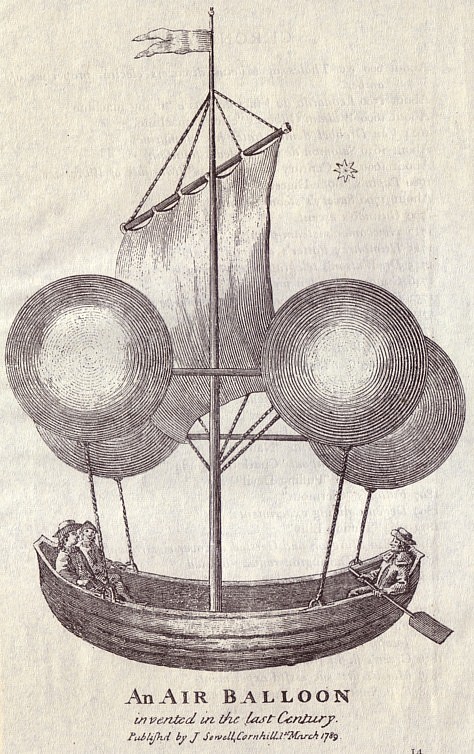hot air balloons
link to site about Father Bartolomeu de Gusmao
the story of aerial navigation
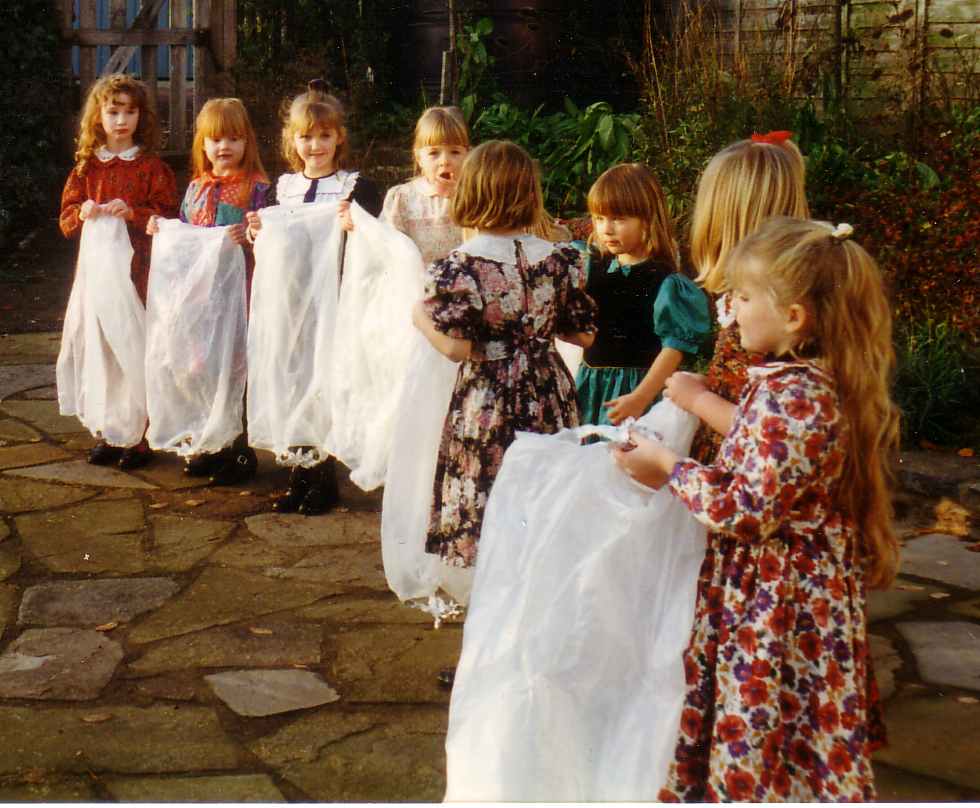
This is Jeff Bindon's explanation of why a hot air balloon flies:
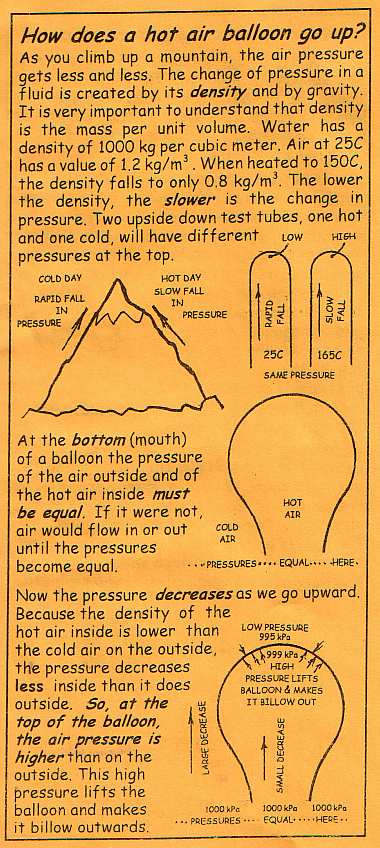
Solar powered hot air balloons are much safer than ones with burners, although they take longer to make. They stay up as long as the sun does.

Inflate it with a hair dryer or small hand-held fan

The heat of direct sun on the black plastic makes it fly; the minimum size that
works is about one cubic meter, this is with bin liners that weigh under 14 grams. They are very difficult to find.
It can be made on an area of table-edge 1m by 5cm. Saves that tiresome preliminary
of tidying a table.
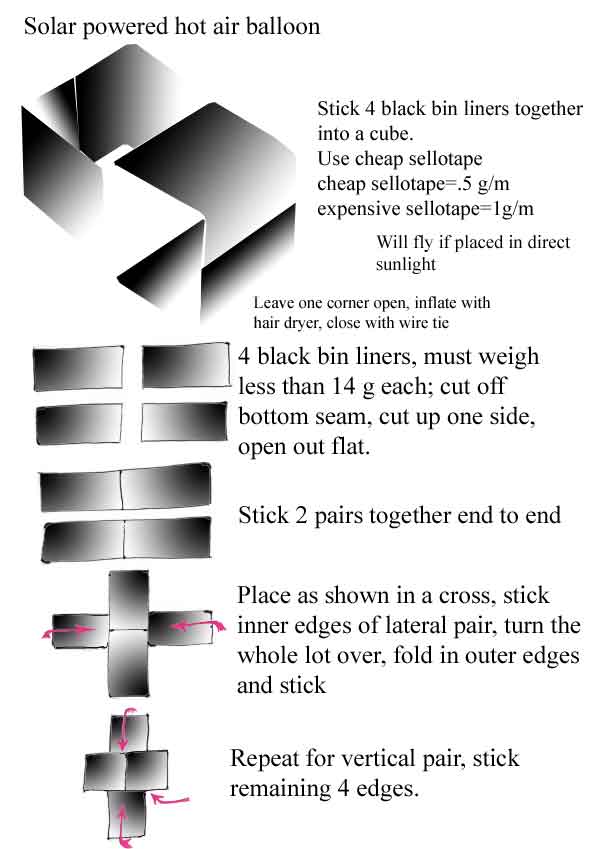
It works as a very good indoor demonstration when there isn't any sunshine: inflate
with fan as normal then heat inside with 1.5 kW paint stripping gun (you can't
fill it with the paint stripping gun or it will melt). It should then stay up
for 90 seconds, 45 seconds with a 15 gram load.
This is a solar mobile

It is a solar motor & propellor stuck to the back of a
solar cell.
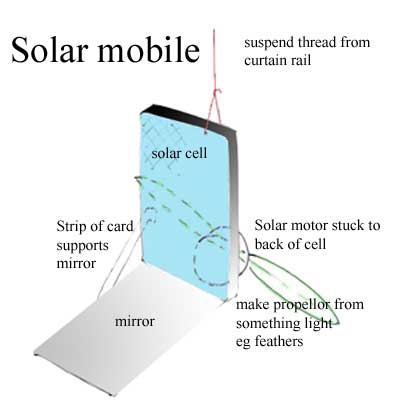
The plastic mirror increases the effectiveness of the cell at little extra cost; when it is suspended in direct sunlight the mobile rotates slowly, its propellor turns only when the mobile faces the sun. Eventually there is enough twist in the thread to exactly balance the impulse of the propellor whereupon the mobile twists and untwists through a small angle without actually rotating.
The propellor should be made of something light such as paper to minimise the starting torque.
movie of mobiles
man's first flight
This balloon was 70 feet high and 46 feet in
diameter. It weighed 1,600 lb. and had a capacity of 60,000 cubic feet.
I wish to describe as well as I can the first journey which men
have attempted through an element which, prior to the discovery of MM. Montgolfier, seemed so little fitted to support them.
We went up on the 21st of October, 1783, at near two o�clock, M. Rozier on the west side of the balloon, I on the east. The wind was nearly north-west. The machine, say the public, rose with majesty; but really the position of the balloon altered so that M. Rozier was in the advance of our position, I in the rear.
I was surprised at the silence and the absence of movement
which our departure caused among the spectators, and believed them to be astonished and perhaps awed at the strange spectacle; they might well have reassured themselves. I was still gazing, when M. Rozier cried to me-
�You are doing nothing, and the balloon is scarcely rising a
fathom.�
�Pardon me,�I answered, as I placed a bundle of straw upon the fire and slightly stirred it. Then I turned quickly, but already we had passed out of sight of La Muette. Astonished I cast a glance towards the river. I perceived the confluence of the Oise. And naming the principal bends of the river by the places nearest them I cried, �Passy, St. Germain, St. Denis, Sevres!�
�If you look at the river in that fashion you will be likely to
bathe in it soon,� cried Rozier. �Some fire, my dear friend, some fire!�
We travelled on; but instead of crossing the river, as our
direction seemed to indicate, we bore towards the Invalides, then returned upon the principal bend of the river, and travelled to above the barrier of La Conference, thus dodging about the river, but not crossing it.
�The river is very difficult to cross,� I remarked to my companion.
�So it seems,� he answered; �but you are doing nothing. I
suppose it is because you are braver than I, and don�t fear a
tumble.�
I stirred the fire, I seized a truss of straw with my fork; I raised it and threw it in the midst of the flames. An instant afterwards I felt myself lifted as it were into the heavens.
�For once we move,�said I.
�Yes, we move,� answered my companion.
At the same instant I heard from the top of the balloon a sound which made me believe that it had burst. I watched, yet I saw nothing. My companion had gone into the interior, no doubt to make some observations. As my eyes were fixed on the top of the machine I experienced a shock, and it was the only one I had yet felt. The direction of the movement was from above downwards.
I then said-
�What are you doing? Are you having a dance to yourself?�
�I�m not moving.�
�So much the better. It is only a new current which I hope will carry us from the river,� I answered.
I turned to see where we were, and found we were between the Ecole Militaire and the Invalides.
�We are getting on,� said Rozier.
�Yes, we are travelling.�
�Let us work, let us work,� said he.
I now heard another report in the machine, which I believed
was produced by the cracking of a cord. This new intimation
made me carefully examine the inside of our habitation. I saw
that the part that was turned towards the south was full of holes, of which some were of a considerable size.
�We must descend,� I then cried.
�Why?�
�Look!� I said. At the same time I took my sponge and quietly
extinguished the little fire that was burning some of the holes
within my reach; but at the same moment I perceived that the
bottom of the cloth was coming away from the circle which
surrounded it.
�We must descend,� I repeated to my companion.
He looked below.
�We are upon Paris,� he said.
�It does not matter,�I answered. �Only look! Is there no danger? Are you holding on well?�
�Yes.�
I examined from my side, and saw that we had nothing to fear.
I then tried with my sponge the ropes which were within my reach.
All of them held firm. Only two of the cords had broken.
I then said, �We can cross Paris.�
During this operation we were rapidly getting down to the
roofs. We made more fire, and rose again with the greatest ease.
I looked down, and it seemed to me we were going towards the towers of St. Sulpice; but, on rising, a new current made us quit this direction and bear more to the south. I looked to the left, and beheld a wood, which I believed to be that of Luxembourg. We were traversing the boulevard, and I cried all at once-
�Get to ground!�
But the intrepid Rozier, who never lost his head, and who judged more surely than I, prevented me from attempting to descend. I then threw a bundle of straw on the fire. We rose again, and another current bore us to the left.
We were now close to the ground, between two mills. As soon as we came near the earth I raised myself over the gallery, and leaning there with my two hands, I felt the balloon pressing softly against my head. I pushed it back, and leaped down to the ground. Looking round and expecting to see the balloon still distended, I was astonished to find it quite empty and flattened.
On looking for Rozier I saw him in his shirt-sleeves creeping from under the mass of canvas that had fallen over him. Before attempting to descend he had put off his coat and placed it in the basket. After a deal of trouble we were at last all right.
As Rozier was without a coat I besought him to go to the nearest house. On his way thither he encountered the Duke of Chartres, who had followed us, as we saw, very closely, for I had had the honour of conversing with him the moment before we set out.
On the day after the experiment of the Champ de Mars (27th of August),
Professor Charles-who had already acquired celebrity at the Louvre,
by his scientific collection and by his rank as an official instructor-and the Brothers
Robert, mechanicians, were engaged in the construction of a balloon, to be
inflated with hydrogen gas, and destined to carry a car and one or two passengers. For
this ascent Charles may be said to have created all at once the art of aerostation
as now practiced, for he brought it at one bound to such perfection that since his
day scarcely any advance has been made upon his arrangements. His simple yet
complete invention was that of the valve which gives escape to the hydrogen gas,
and thus renders the descent of the balloon gentle and gradual; the car that
carries the travellers; the ballast of sand, by which the ascent is regulated and the fall
is moderated; the coating of caoutchouc, by means of which the material of the
balloon is rendered airtight and prevents loss of gas; and, finally, the use of the
barometer, which marks at every instant, by the elevation or the depression of the
mercury, the position in which the aeronaut finds himself in the atmosphere.
Charles created all the contrivances, or, in other words, all the ingenious
precautions which make up the art of aerostation.
On the 26th of November, the balloon, fitted with its network, and having the
car attached to it, was sent away from the hall of the Tuileries, where it had been
exhibited. The ascent was fixed for the 1st of December, 1783, a memorable day
for the Parisians.
At noon upon that day, the subscribers, who had paid four louis for their seats,
took their places within the enclosure outside the circle, in which stood the casks
employed for making the gas. The humbler subscribers, at three francs a head,
occupied the rest of the garden. The number of spectators, as we read underneath
the numerous coloured prints which represent this spectacle, was 600,000; but
though, without doubt, the gardens of the Tuileries are very large, it is probable
this figure is a considerable overstatement, for this number would have been
three-fourths of the whole population of Paris.
The roofs and windows of the houses were crowded, whilst the Pont Royal and
the square of Louis XV were covered by an immense multitude. About midday
a rumour was spread to the effect that the king forbade the ascent. Charles ran to
the Chief Minister of State, and plainly told him that his life was the king's, but
his honour was his own: his word was pledged to the country and he would
ascend. Taking this high ground, the bold professor gained an unwilling
permission to carry out his undertaking.
A little afterwards the sound of cannon was heard. This was the signal which
announced the last arrangements and thus dissipated all doubt as to the rising of
the balloon. There had during the day been considerable disturbance among the
crowd, between the partisans of Charles and Montgolfier; each party extolled its
hero, and did everything possible to detract from the merits of the rival inventor.
But whatever ill-feeling might have existed was swept away by Professor Charles
with a compliment. When he was ready to ascend, he walked up to Montgolfier,
and, with the true instinct of French politeness,
presented him with a little balloon, saying at the same time-
"It is for you, monsieur, to show us the way to the skies."
The exquisite taste and delicacy of this incident touched the bystanders as with
an electric shock, and the place at once rang out with the most genuine and hearty
applause. The little balloon thrown up by Montgolfier sped away to the north-
east, its beautiful emerald colour showing to fine effect in the sun.
From this point let us follow the narrative of Professor Charles himself.
"The balloon," he says, "which escaped from the hands of M. Montgolfier, rose
into the air, and seemed to carry with it the testimony of friendship and regard
between that gentleman and myself, while acclamations followed it. Meanwhile,
we hastily prepared for departure. The stormy weather did not permit us to have
at our command all the arrangements which we had contemplated the previous
evening; to do so would have detained us too long upon the earth.
After the balloon and the car were in equilibrium, we threw over 19 lbs. of ballast, and we rose
in the midst of silence, arising from the emotion and surprise felt on all sides.
"Nothing will ever equal that moment of joyous excitement which filled my
whole being when I felt myself flying away from the earth. It was not mere pleasure;
it was perfect bliss. Escaped from the frightful torments of persecution and
of calumny, I felt that I was answering all in rising above all.
"To this sentiment succeeded one more lively still-the admiration of the majestic
spectacle that spread itself out before us. On whatever side we looked, all was glorious;
a cloudless sky above, a most delicious view around. 'Oh, my friend,' said I to
M. Robert, `how great is our good fortune! I care not what may be the condition of
the earth; it is the sky that is for me now. What serenity! what a ravishing scene!
Would that I could bring here the last of our detractors, and say to the wretch,
Behold what you would have lost had you arrested the progress of science.'
"Whilst we were rising with a progressively increasing speed, we waved our bannerets
in token of our cheerfulness, and in order to give confidence to those below
who took an interest in our fate. M. Robert made an inventory of our stores; our
friends had stocked our commissariat as for a long voyage-champagne and other
wines, garments of fur and other articles of clothing.
"`Good,' I said; `throw that out of the window.' He took a blanket and launched
it into the air, through which it floated down slowly, and fell upon the dome of
l'Assomption.
"When the barometer had fallen 26 inches, we ceased to ascend. We were up at
an elevation of 1,800 feet. This was the height to which I had promised myself to
ascend; and, in fact, from this moment to the time when we disappeared from the
eyes of our friends, we always kept a horizontal course, the barometer registering
26 inches to 26 inches 8 lines.
"We required to throw over ballast in proportion as the almost insensible escape of
the hydrogen gas caused us to descend, in order to remain as nearly as possible at
the same elevation. If circumstances had permitted us to measure the amount of
ballast we threw over, our course would have been almost absolutely horizontal.
"After remaining for a few moments stationary, our car changed its course and
we were carried on at the will of the wind. Soon we passed the Seine, between St.
Ouen and Asnieres. We traversed the river a second time, leaving Argenteuil upon
the left. We passed Sannois, Franconville, Eau-Bonne, St. Leu-Taverny, Villiers,
and finally, Nesles. This was about twenty-seven miles from Paris, and we had
reached this distance in two hours, although there was so little wind that the air
scarcely stirred.
"During the whole course of this delightful voyage, not the slightest apprehension
for our fate or that of our machine entered my head for a moment. The globe did
not suffer any alteration beyond the successive changes of dilatation and compression,
which enabled us to mount and descend at will. The thermometer was,
during more than an hour, between ten and twelve degrees above zero; this being
to some extent accounted for by the fact that the interior of the car was warmed
by the rays of the sun.
"At the end of fifty-six minutes, we heard the report of the cannon which
informed us that we had, at that moment, disappeared from view at Paris. We
rejoiced that we had escaped, as we were no longer obliged to observe a
horizontal course, and to regulate the balloon for that purpose.
"We gave ourselves up to the contemplation of the views which the immense
stretch of country beneath us presented. From that time, though we had no
opportunity of conversing with the inhabitants, we saw them running after us
from all parts; we heard their cries, their exclamations of solicitude, and knew
their alarm and admiration.
"We cried, 'Vive le Roi!' and the people responded. We heard, very distinctly-
'My good friends, have you no fear? Are you not sick? How beautiful it is! Heaven
preserve you! Adieu, my friends.'
"I was touched to tears by this tender and true interest which our appearance had
called forth.
"We continued to wave our flags without cessation, and we perceived that these
signals greatly increased the cheerfulness and calmed the solicitude of the people
below. Often we descended sufficiently low to hear what they shouted to us. They
asked us where we came from, and at what hour we had started.
"We threw over successively frock-coats, muffs, and habits. Sailing on above the
Ile d'Adam, after having admired the splendid view, we made signals with our
flags, and demanded news of the Prince of Conti. One cried up to us, in a very
powerful voice, that he was at Paris, and that he was ill. We regretted missing such
an opportunity of paying our respects, for we could have descended into the
prince's gardens, if we had wished, but we preferred to pursue our course, and we
re-ascended. Finally, we arrived at the plain of Nesles.
"We saw from the distance groups of peasants, who ran on before us across the
fields. 'Let us go,' I said, and we descended towards a vast meadow.
"Some shrubs and trees stood round its border. Our car advanced majestically in
a long inclined plane. On arriving near the trees, I feared that their branches
might damage the car, so I threw over two pounds of ballast, and we rose again.
We ran along more than 120 feet, at a distance of one or two feet from the
ground, and had the appearance of travelling in a sledge. The peasants ran after
us without being able to catch us, like children pursuing a butterfly in the fields.
"Finally, we stopped, and were instantly surrounded. Nothing could equal the
simple and tender regard of the country people, their admiration, and their lively emotion.
"I called at once for the cures and the magistrates. They came round me on all
sides: there was quite a fete on the spot. I prepared a short report, which the cures
and the syndics signed. Then arrived a company of horsemen at a gallop. These
were the Duke of Chartres, the Duke of Fitzjames, and M. Fatter. By a very
singular chance, we had come down close by the hunting-lodge of the latter. He
leaped from his horse and threw himself into my arms, crying, 'Monsieur Charles,
I was first!'
"Charles adds that they were covered with the caresses of the prince, who
embraced both of them. He briefly narrated to the Duke of Chartres
some incidents of the voyage.
"`But this is not all, monseigneur. I am going away again,' added Charles.
"`What! Going away!' exclaimed the duke.
"`Monseigneur, you will see. When do you wish me to come back again?' I said.
"`In half an hour.'
"`Very well: be it so. In half an hour I shall be with you again.'
"M. Robert descended from the car, and I was alone in the balloon.
"I said to the duke, `Monseigneur, I go.' I said to the peasants who held down the
balloon, `My friends, go away, all of you, from the car at the moment I give the
signal.' I then rose like a bird, and in ten minutes I was more than 3,000 feet
above the ground. I no longer perceived terrestrial objects; I only saw the great
masses of nature.
"In going away, Charles had taken his precautions against the possible explosion
of the balloon, and made himself ready to make certain observations. In order to
observe the barometer and the thermometer, placed at different extremities of the
car, without endangering the equilibrium, he sat down in the middle, a watch and
paper in his left hand, a pen and the cord of the safety-valve in his right.
"I waited for what should happen," continues he. "The balloon, which was quite
flabby and soft when I ascended, was now taut, and fully distended. Soon the
hydrogen gas began to escape in considerable quantities by the neck of the
balloon, and then, from time to time, I pulled open the valve to give it two issues at
once; and I continued thus to mount upwards, all the time losing the
inflammable air, which, rushing past me from the neck of the balloon, felt like a warm
cloud.
"I passed in ten minutes from the temperature of spring to that of winter; the cold
was keen and dry, but not insupportable. I examined all my sensations calmly; I
COULD HEAR MYSELF LIVE, so to speak, and I am certain that at first I
experienced nothing disagreeable in this sudden passage from one temperature to
another.
"When the barometer ceased to move I noted very exactly eighteen inches ten
lines. This observation is perfectly accurate The mercury did
not suffer any sensible movement.
"At the end of some minutes the cold caught my fingers; I could hardly hold the
pen, but I no longer had need to do so. I was stationary, or rather moved only in
a horizontal direction.
"I raised myself in the middle of the car, and abandoned myself to the spectacle
before me. At my departure from the meadow the sun had sunk to the people of
the valleys; soon he shone for me alone, and came again to pour his rays upon the
balloon and the car. I was the only creature in the horizon in sunshine-all the
rest of nature was in shade. Ere long, however, the sun disappeared, and thus I
had the pleasure of seeing him set twice in the same day. I contemplated for some
moments the mists and vapours that rose from the valley and the rivers. The
clouds seemed to come forth from the earth, and to accumulate the one upon the
other. Their colour was a monotonous grey-a natural effect, for there was no
light save that of the moon.
"I observed that I had tacked round twice, and I felt currents which called me to
my senses. I found with surprise the effect of the wind, and saw the cloth of my
flag: extended horizontally.
"In the midst of the inexpressible pleasure of this state of ecstatic contemplation,
I was recalled to myself by a most extraordinary pain which I felt in the interior
of the ears and in the maxillary glands. This I attributed to the dilation of the air
contained in the cellular tissue of the organ as much as to the cold outside. I was
in my vest, with my head uncovered. I immediately covered my head with
a bonnet of wool which was at my feet, but the pain only disappeared with my descent
to the ground.
"It was now seven or eight minutes since I had arrived at this elevation, and I now
commenced to descend. I remembered the promise I had made to the Duke of
Chartres, to return in half an hour. I quickened my descent by opening the valve
from time to time. Soon the balloon, empty now to one half, presented the
appearance of a hemisphere.
"Arrived at twenty-three fathoms from the earth, I suddenly threw over two or
three pounds of ballast, which arrested my descent, and which I had carefully kept
for this purpose. I then slowly descended upon the ground, which I had, so to
speak, chosen."
space on a shoestring
read about the fu-go
tracking keyfob radio attached to party balloon
My email is davidvwilliamson@hotmail.com
back to main site
